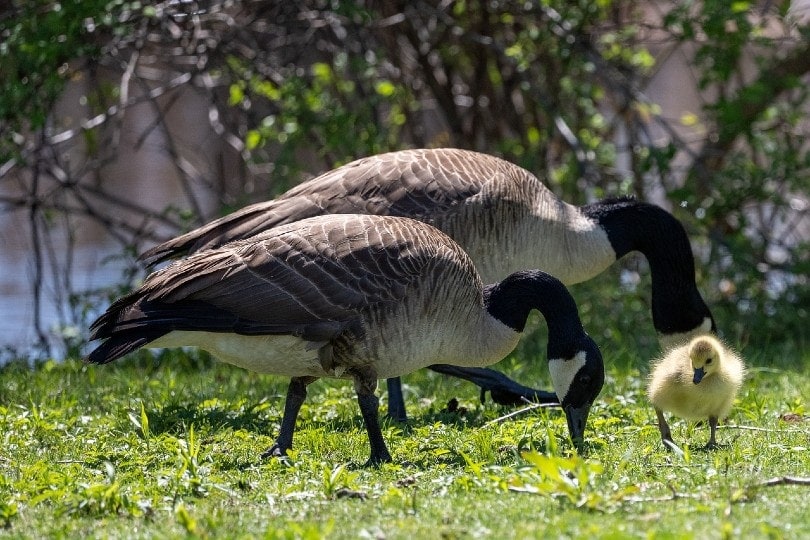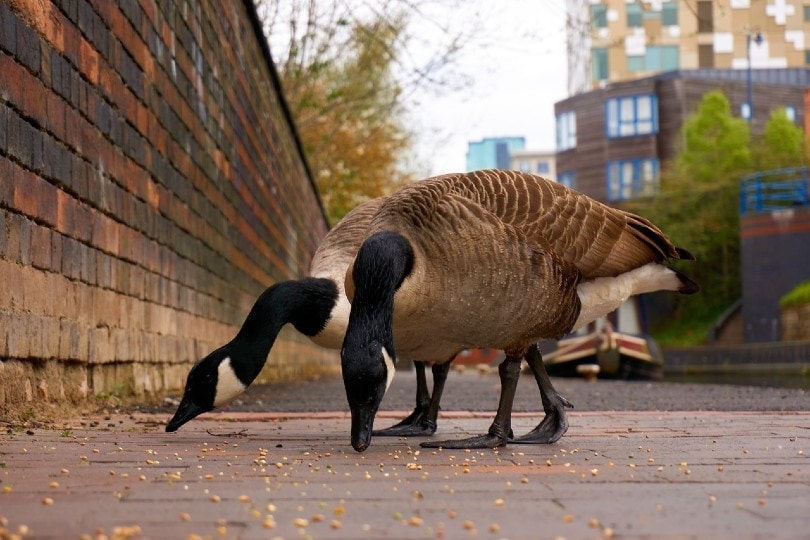What Do Geese Eat in the Wild & Domestically?
Last Updated on

Many people don’t realize that geese have a reputation for being very picky eaters. While geese are stout of size and considered to be in the same family as ducks and swans, they are super picky about what they eat.
Humans have been domesticating these waterfowl for over 2,000 years, which may partially account for why they’re so picky. So, what exactly do these waterfowl eat, you might ask? In this blog, we’ll talk about what they eat when they’re on their own and as domesticated pets and a few facts you might not have known about geese as well.

What Do Geese Eat?
Geese like to forage, so you’ll usually find them looking for grass and plants. In fact, geese spend much of their time looking for food.
- Seeds
- Leaves from any type of grass
- Insects
- Moss
- Stems
- Bulbs
- Grain
- Mollusks
- The odd berry or two

While most species of geese are omnivores, they spend a lot of time eating and foraging through the grass. There are some species, however, such as Canadian geese, that are herbivores.
Geese are noisy, mate for life, and breed mainly in the Northern hemisphere, meaning they adapt to the cold easily. However, since geese have a thick layer of fat that protects their bottom half from the cold water in cold temperatures, it means they have quite a demanding diet to keep up with it.
Now that you know what geese eat let’s break it down to what and where in our next section.
What Do Geese Forage for in the Grass?
Of course, geese forage for different things in the grass than they do in the water. Since geese have strong serrated bills, it’s easier for them to eat dense plant matter. Of course, grass doesn’t have very much nutritional value, so the geese will be foraging for roots, bulbs, and seeds with more nutritional value than just grass.
While the geese aren’t specifically looking for insects to munch on, they will scoop them up and eat them if they come across them while foraging. This helps supply protein the geese need to be healthy and active as well.

What Do Geese Forage for in the Water?
Geese are waterfowl, and like most waterfowl, they forage for aquatic plants. These plants can include kelp, watercress, and seaweed. Again, though the geese aren’t specifically looking for insects in the water, they will eat them and small fish as well if they get in their path.
Geese prefer to feed on land but will feed in the water when they feel like it. So while they aren’t going to go out of their way to feed in the water or to eat small fish and aquatic insects, they will from time to time.
What Do Geese Eat in the Winter Season?
While most geese migrate to warmer climates in the winter, not all do. That’s why geese work to build up their fat reserves before the colder season begins. They do this by increasing their carbohydrate intake, eating more grains to increase body heat.
Since geese are plump and rotund, they’ll eat whatever they must to stay healthy and plump. These are wild geese, however. Have you ever wondered what to feed the domestic geese in your pond? Read on below to find out.
What Should Domestic Geese Eat?
Honestly, since geese are so great at foraging for their own food, if they have plenty of land to roam on, they’ll pretty much take care of themselves in the eating department.
There are a few foods one can keep on hand to supplement the geese’s diet. They love leafy, green vegetables, so keeping them supplied with chard, spinach, alfalfa sprouts, and lettuce is a great way to ensure they get them.
In fact, geese love just about any vegetable, so you can feed them green beans, carrots, or celery as well, and they’ll be happy and healthy. Add in some cooked rice, wheat, and corn, especially as the winter sets in, and pet geese will be fine.
What Should Baby Geese Eat?
Goslings in the wild eat clover and plain grass. Domesticated goslings will do the same, but one might also want to add some chickweed to their diet. Goslings grow quickly and don’t have strict requirements for their diet in the wild or when they’re domesticated.

What Shouldn’t Be Fed to Geese?
Just as there are things you should feed your domestic geese, there are also foods you shouldn’t feed them as well. Geese are picky eaters. For example, while they’ll eat seeds, they’re not going to chow down on seeds from sunflowers. That’s something they won’t eat because they’re super picky.
However, there are also foods that you should avoid feeding them at all costs, as it could make your geese sick.
- Uncooked potatoes
- Seeds from most types of fruits
- Tomato plant leaves
- Uncooked rice. Cooked rice is fine. They love it, and it should be something they eat often.
- Peanuts and most other nuts
- Citrus fruits
- Onions
These are just a few foods that we know of that you don’t need to feed your geese. Do your research before giving your pet geese any type of food, and if you’re in doubt about whether it’s the right choice, then just refrain from feeding it to them.
Of course, when it comes to feeding geese, you’re also going to want to make sure they have plenty of water available no matter what season it is, just as with any other animal you’re taking care of.

Conclusion
Geese are gorgeous creatures and very picky eaters. However, they get along fine in the wild and can get along fine when they’re domesticated if you feed them the right foods. If you own geese, follow the tips above for the best results.
Featured Image Credit: GregSabin, Pixabay
About the Author Robert Sparks
Robert’s obsession with all things optical started early in life, when his optician father would bring home prototypes for Robert to play with. Nowadays, Robert is dedicated to helping others find the right optics for their needs. His hobbies include astronomy, astrophysics, and model building. Originally from Newark, NJ, he resides in Santa Fe, New Mexico, where the nighttime skies are filled with glittering stars.
Related Articles:
What Is the Best Binocular Magnification for Hunting? Optical Features Explained
How to Clean a Refractor Telescope: Step-by-Step Guide
How to Clean a Telescope Eyepiece: Step-by-Step Guide
How to Clean a Rifle Scope: 8 Expert Tips
Monocular vs Telescope: Differences Explained (With Pictures)
What Is a Monocular Used For? 8 Common Functions
How to Clean a Telescope Mirror: 8 Expert Tips
Brightfield vs Phase Contrast Microscopy: The Differences Explained
